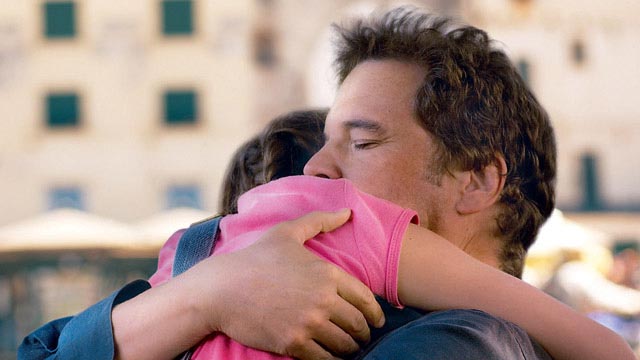CHICAGO – In anticipation of the scariest week of the year, HollywoodChicago.com launches its 2024 Movie Gifts series, which will suggest DVDs and collections for holiday giving.
DVD Review: ‘A Summer in Genoa’ Finds Michael Winterbottom in Top Form
CHICAGO – At age 50, Michael Winterbottom is still one of the freshest talents on the block. His ability to reinvent himself is almost unparalleled at a time when many of the world’s most respected filmmakers go to the same well once too often. Granted, some of Winterbottom’s experiments pay off more than others, but when they succeed, they do so on a grand scale.
“A Summer in Genoa” is one of the best films Winterbottom has ever made. Americans audiences already seem to have forgotten the picture, which debuted to little fanfare in 2008 (a year after the director’s Angelina Jolie vehicle, “A Mighty Heart”). Since Winterbottom’s prolific work ethic parallels that of filmmakers half his age, he approached “Genoa” as yet another shoestring experiment, baring several stylistic similarities to the documentary realism in his 2004 effort, “9 Songs.”
 DVD Rating: 5.0/5.0 |
Yet “Genoa” proves to be a riveting example of how effective Winterbottom’s spontaneous style can be when put to the service of a compelling story. The film opens with a deeply unsettling sequence involving a seemingly harmless car game that quickly goes awry. The sounds of passing vehicles take on an increasingly malevolent tone, as Kelly (Willa Holland) and her little sister, Mary (Perla Haney-Jardine), try to outdo each other in their competition to guess the colors of oncoming cars. When Mary tries to include her mother, Marianne (Hope Davis), in the fun, the results are disastrous. Marianne is killed in a crash, leaving her husband, Joe (Colin Firth), solely in charge of the two girls, the elder bursting with hormones and resentment, the younger wracked with guilt. As he drifts through his wife’s wake in a silent daze, Firth conveys the weight of his character’s sorrow through subtle nuances and soft murmurs. His performance is a beautifully restrained piece of work, hinting at the vulnerability and raw pathos he would later exude in “A Single Man” and “The King’s Speech.” Joe has little time for grieving, and tries to keep a cool head even in the most unthinkable of circumstances. He decides that what he and his daughters need is a change of scenery.

Colin Firth shines in Michael Winterbottom’s A Summer in Genoa.
Photo credit: Entertainment One
After his friend and former flame, Barbara (Catherine Keener), informs him of a teaching gig in Italy, Joe moves his family from Chicago to Genoa, which becomes somewhat of a schizophrenic character unto itself. While the picturesque buildings and sparkling beaches certainly appear welcoming, the sun is barely able to peek through the murky alleyways that seem designed to play on one’s claustrophobia and paranoia. Kelly is amused by the catcalls she receives, and decides to explore her sexuality with local boys, while distancing herself entirely from Mary, who’s left to wander the streets as if she were an only child. It’s heartrending to observe the family’s patterns of behavior during these crucial months, such as Firth’s nightly ritual of waking up to comfort Mary, as she wails for her mother.
We soon discover that Mary is having visions of Marianne, who frequently materializes at her bedside, only to leave her reeling with sorrow. Is this a true apparition, or a nightmare spawned by the crippling regret that continues to gnaw away at her soul? Haney-Jardine sported a natural presence as Uma Thurman’s daughter in “Kill Bill: Vol. 2,” but this film proves that she’s the real deal. Her exceptional openness and honesty as a performer results in moments of truth that never once feel forced. The same can be said of the entire film, which subverts its seemingly predictable premise by avoiding all of the expected clichés. Marcel Zyskind’s handheld cinematography turns some shots into artful abstractions, such as the extreme close-up of Firth swimming to check up on his daughter. Under Zyskin’s lens, the chaotic texture of the water externalizes the parental anxiety and emotional insecurity that Joe tries so desperately to keep beneath the surface.
 A Summer in Genoa was released on DVD on April 12, 2011. Photo credit: Entertainment One |
“A Summer in Genoa” is presented in its 2.35:1 aspect ratio, and includes 20 minutes of cast and crew interviews. Winterbottom says that the film’s plot reminded him a great deal of the Marguerite Duras novel, “Moderato Cantabile,” which also had a similarly repetitive structure, as it followed a child being taken to piano lessons. Since Winterbottom has two daughters, everyone on the production seemed to be well aware of the film’s intimate connection to the director’s life. Firth says that when a film is a truly personal labor of love, it naturally causes each actor to draw upon their own experiences for inspiration. According to Haney-Jardine, Winterbottom never spoke to her about her character, and only asked technical questions about her musical abilities. Keener pays her young co-star the ultimate compliment by admitting that whenever she felt lost in a scene, she would “hone in on Perla” to get back on track.
What’s most interesting are the actors’ descriptions of Winterbottom’s creative process. In nearly seven minutes of behind-the-scenes footage, the actors are seen walking the streets of Genoa while followed by a skeleton crew barely garnering the attention of locals. One woman even mistook the stars for an actual family, and warned Keener that she was entering an unsafe area for her kids. It’s clear that the cast felt liberated by Winterbottom’s guerilla filmmaking techniques, which Firth says gave him the “benefit of momentum.” Davis particularly appreciated being part of a film that wasn’t just about “how you look.”
Both Winterbottom and Firth defend the picture’s open-ended conclusion, arguing that “Genoa” was more about a family’s attempts to move on with their lives, rather than remain stagnant in their despair. Though Firth points out that death does not destroy the banalities of daily life, Winterbottom says it’s those very banalities that make up the heart of a family, and that is precisely what he has captured so brilliantly in this uncommonly moving film. No matter how many connections one may have in life, it always ends up being the family ties that bond and bruise the deepest.
 | By MATT FAGERHOLM |


